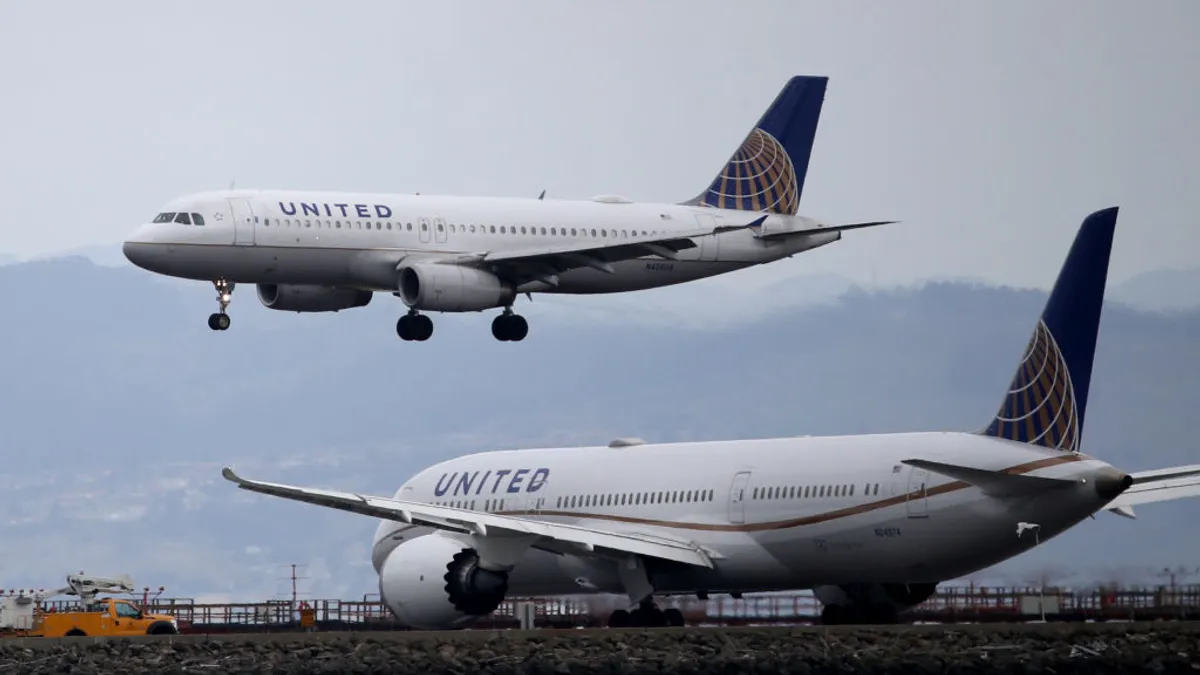Dive Brief:
- A federal judge in the U.S. District Court for the Northern District of Texas denied Tuesday a motion for preliminary injunction by employees of United Airlines who alleged the company's COVID-19 vaccination policy failed to reasonably accommodate exempt employees and retaliated against those seeking exemptions (Sambrano et al. v. United Airlines, No. 4:21-cv-1074-P (N.D. Tex. Aug. 22, 2021)).
- Per the suit, filed by employees on behalf of themselves and other similarly-situated workers, United granted approximately 80% of employees' requests for religious exemptions and 63% of requests for medical exemptions from its mandate. Furthermore, the company offered exempted employees indefinite unpaid leave as an accommodation.
- The workers alleged United's use of indefinite unpaid leave as an accommodation created "irreparable harm" on the basis that it would place them in an "impossible position"; prevent them from accruing seniority while on such leave; cause them to face "‘serious and irreparable injuries resulting from their loss of salary'"; and cause their perishable skills to deteriorate. The judge ruled that the plaintiffs did not sufficiently show that they would likely suffer imminent, irreparable injury absent an injunction and denied the workers' motion.
Dive Insight:
Judge Mark Pittman's decision is one of the most notable court orders dealing with employer COVID-19 vaccination mandates to date, and it comes at a time in which such mandates have been put under the national political, cultural and economic spotlight.
But in terms of its implications for employers that choose to implement a mandate, the ruling is a sort of mixed bag, according to Sara Jodka, member at Dickinson Wright. Jodka told HR Dive that while Sambrano could have some positive implications for mandates, it also involves certain fact-specific details that may not apply to all workplaces.
"I would encourage employers to be reminded that they can't take this particular case as carte blanche to implement their own vaccine mandate," Jodka said. "They will be remiss if they look past the fact that this is specific to the airline industry."
In particular, United's decision to offer unpaid leave as a reasonable accommodation to employees who are unable to receive a COVID-19 vaccine may be suitable in the type of work environment presented by an airline, in which alternatives such as remote work, mandatory masking or social distancing may not be sufficient to guard against the risk of COVID-19 spread whilst employees are working in close quarters aboard an aircraft, she noted.
Additionally, Jodka said, the court's decision does not address the specific question of whether unpaid leave constitutes a reasonable accommodation under either the Americans with Disabilities Act or Title VII within the context of vaccination mandates.
"This Order does not rule on the ultimate merits of this case," Pittman wrote. "Instead, this Order merely rules on Plaintiffs' request for the extraordinary remedy of a preliminary injunction to enjoin United from placing Plaintiffs, and other similarly situated employees, on unpaid leave."
Essentially, the court was tasked with deciding whether the employees' request for emergency injunctive relief was appropriate, Jodka said, not whether United's mandate is legal. Pittman did find that different forms of relief, namely monetary relief, may be sufficient instead of injunctive relief; "The Court sees no reason, however, that these alleged harms could not be compensated through monetary relief," he wrote.
The plaintiffs in Sambrano could conceivably make the case in future proceedings that United's offer of unpaid leave did not constitute a reasonable accommodation under Title VII, but that could take some time. "They probably won't have their case decided on until one to two years down the road," Jodka said. "That is how the case will continue on."
The ruling also did not have any direct bearing on external litigation involving the federal government's emergency temporary standard mandating that U.S. employers with 100 or more employees institute COVID-19 vaccination policies, Jodka added. Over the weekend, the 5th U.S. Circuit of Appeals issued a stay of the ETS, and observers anticipate future legal challenges are on the horizon.
"The legal challenge to the ETS concerns the ability of the federal government to regulate in the manner it did, forcing employers of a certain size to mandate vaccines," Alicia Ouellette, president and dean of Albany Law School, told HR Dive in an email. "The United Airlines case is about the power of a private employer that voluntarily imposed a vaccine mandate on its employees. Vaccine mandates voluntarily imposed by private employers are not dependent on the validity of the ETS."
In spite of any such developments, attorneys previously told HR Dive that employers may want to continue to prepare to comply with the ETS as if it were to take effect by the proposed Jan. 4 effective date. White House Principal Deputy Press Secretary Karine Jean-Pierre agreed with that position during a press briefing Monday. "We think people should not wait," Jean-Pierre said. "We say do not wait to take actions that will keep your workplace safe."














